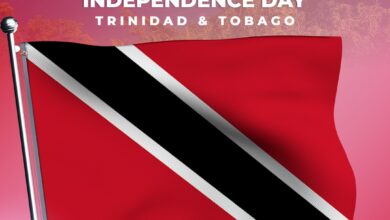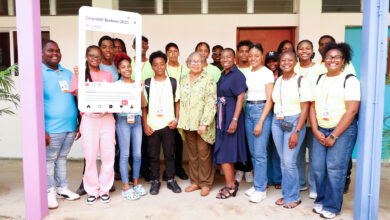(CARICOM Secretariat, Turkeyen, Greater Georgetown, Guyana) CARICOM, on Tuesday, signed a Declaration to becoming one of the newest partners in the new Regional Coalition on Water and Sanitation for the Elimination of Cholera in the Island of Hispaniola.
In signing the Declaration of the Regional Coalition on Water and Sanitation for the Elimination of Cholera in the Island of Hispaniola, CARICOM has pledged to support efforts by the governments of Haiti and the Dominican Republic to harmonize and streamline international assistance and investments in water and sanitation infrastructure aimed at eliminating cholera from the two countries, and to “work… in solidarity, towards the steady improvement of universal access to safe drinking water and sanitation in Haiti and Dominican Republic.”
The Coalition was launched in Salvador, Bahia, June of this year to harness the necessary technical expertise, raise new funds, and mobilize previously committed pledges to fight cholera in Haiti and the Dominican Republic.
Tuesday’s signing took place at a lunch time briefing of Ministers of Health on the Cholera epidemic in Haiti, at the Headquarters of the Pan America Health Organization (PAHO) ahead of the 28th Pan American Sanitary Conference. The World Bank and the International Red Cross Federation also inked their partnership with the Coalition.
CARICOM Secretariat Deputy Secretary-General, Ambassador Lolita Applewhaite, in signing the Declaration on behalf of the Community, noted that the initiative would further consolidate the Region’s efforts to address the public health challenge posed by the cholera epidemic in Haiti, following the January 2010 earthquake.
Between October 2010 and May of this year, more than half a million people became ill as a result of cholera in Haiti, while more than 7,000 have lost their lives. The Dominican Republic has reported more than 21,000 cases and over 400 deaths from cholera.
Pointing to the poor living conditions of more than a million displaced persons in Haiti, Ambassador Applewhaite said the situation had made it difficult to contain the cholera outbreak in that country, particularly in the absence of any reliable form of potable water for the vulnerable.
According to Reports from PAHO, even before the January 2010 earthquake, only 69% of Haiti’s residents had access to safe drinking water. Access to sanitation had declined from 26% of the population in 1990 to only 17% in 2010. In the Dominican Republic, 86% of the population had access to improved drinking water sources and 83% had access to improved sanitation in 2010.
The CARICOM Deputy Secretary General told her audience of Health Ministers and other International Development Partners that the CARICOM Secretariat was instrumental in directing support to the Water, Sanitation and Hygiene (WASH) initiative which targets improvement in sanitation infrastructure and sensitization of sections of the population to the importance of proper hygiene practices in combating the cholera epidemic. This, she said, was achieved in partnership with the government of Australia and the International Organization for Migration (IOM).
“We hope to be able to maintain this tangible contribution to WASH. In addition of course, we pledge our advocacy and championship for this cause,” she added.
In this regard, she acknowledged the pivotal role of the international community “in the restoration of some degree of normalcy in the aftermath of the earthquake” and noted that such commitment was still necessary because “without reliable sanitation and basic potable water, cholera will remain endemic.”
“The countries of the Region of the Americas, supported by PAHO and the International Financial Institutions, turned back the 1990 cholera threat. We have done this before and are committed to working with our partners to do it again,” she concluded.
The initial members of the new coalition are the Pan American Health Organization/World Health Organization (PAHO/WHO), UNICEF, the Centers for Disease Control and Prevention (CDC), the Spanish Agency for International Development Cooperation (AECID) and the Inter-American Association of Sanitary and Environmental Engineering (AIDIS), Haiti and the Dominican Republic.
The following is the link to the text of the Declaration: http://haiti.mphise.net/sites/default/files/2012jun4_ENGLISH%20-%20Declaration%20Final%20With%20All%20Names%20June%204%202012%20(1).doc





